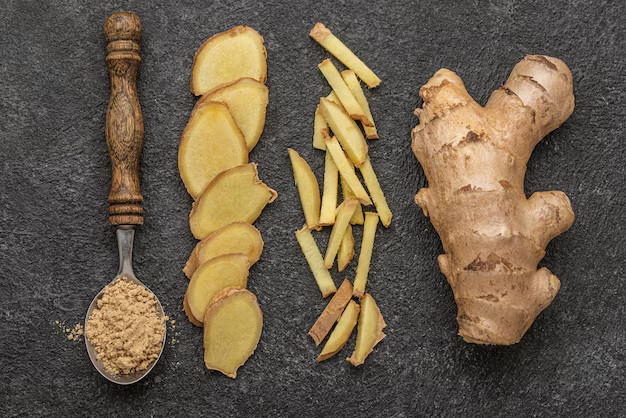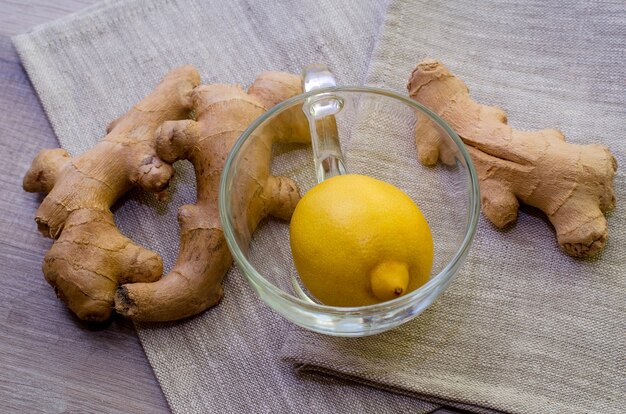Acid reflux and GERD are common digestive issues that cause discomfort and disrupt daily life. Acid reflux occurs when stomach acid flows back into the esophagus, leading to symptoms like heartburn and regurgitation. GERD, or gastroesophageal reflux disease, is a more severe and chronic form of acid reflux.
Ginger, a well-known natural remedy, has been celebrated for its digestive health benefits for centuries. It’s widely used to relieve nausea, indigestion, and other stomach-related concerns. But is ginger effective for acid reflux? This article explores the medicinal properties of ginger and its potential to help those suffering from acidity and GERD.
What Is Acid Reflux and GERD?
Acid reflux happens when the lower esophageal sphincter (LES) weakens or relaxes at the wrong time. This allows stomach acid to flow back into the esophagus. Common symptoms include:
- Heartburn (a burning sensation in the chest).
- Regurgitation of sour-tasting liquid.
- A lump-like sensation in the throat.
When acid reflux occurs frequently or becomes severe, it progresses to GERD. GERD can lead to complications like esophagitis, Barrett’s esophagus, or even esophageal cancer if untreated.
Dietary choices play a significant role in triggering or soothing these symptoms. Spicy, fatty, or acidic foods can exacerbate acidity, while natural remedies may help alleviate it.
Ginger and Its Medicinal Properties
Ginger has long been valued for its medicinal properties. It is a potent anti-inflammatory agent, making it effective for conditions involving irritation or swelling. It is also a natural digestive aid that helps:
- Soothe the stomach lining.
- Relieve nausea and vomiting.
- Improve digestion by speeding up gastric emptying.
Active Compounds in Ginger
The key bioactive compounds in ginger are gingerol and shogaol. These components are responsible for its strong anti-inflammatory and antioxidant effects. Gingerol, in particular, aids digestion and combats nausea.
Is Ginger Acidic or Alkaline?
Ginger is neither highly acidic nor alkaline. It has a pH close to neutral and does not irritate the stomach lining. Its natural properties make it gentle on the digestive system and suitable for soothing acid reflux symptoms.
Is Ginger Good for Acid Reflux and GERD?
Ginger is widely considered a helpful remedy for managing acid reflux. Here’s why:
1. Reduces Nausea
Ginger’s ability to reduce nausea is well-documented. For individuals with GERD, nausea can be a troubling symptom, especially after meals.
2. Improves Gastric Motility
Ginger enhances gastric emptying, ensuring that food moves quickly through the digestive tract. This reduces the risk of stomach contents lingering and causing reflux.
3. Anti-Inflammatory Action
The anti-inflammatory properties of ginger can soothe the esophageal lining, which is often irritated in GERD patients.
Potential Concerns
While ginger is beneficial, excessive consumption may backfire. Large quantities can lead to heartburn, as ginger has a warming nature that might irritate sensitive individuals. Moderation is key
Forms of Ginger and Their Effects on Acid Reflux

The effect of different ginger forms on stomach acidity is discussed here.
1. Is Ginger Root Good for Acid Reflux?
Fresh ginger root is an excellent option for acid reflux relief. You can use small slices in hot water to make ginger tea, which calms the stomach and reduces irritation.
2. Is Raw Ginger Good for Acid Reflux?
Yes, raw ginger can be effective, but it’s important to consume it in small amounts. Chewing on thin slices or grating it into dishes can provide digestive benefits. However, overuse may be too strong for sensitive stomachs.
3. Is Ground Ginger Good for Acid Reflux?
Ground ginger is versatile and can be added to recipes or teas. It retains the active compounds of fresh ginger, offering similar benefits. However, avoid using too much, as its concentrated form can cause irritation.
4. Is Crystallized Ginger Good for Acid Reflux?
Crystallized ginger can help in moderation. However, it’s often coated in sugar, which may trigger reflux in some individuals. Consume sparingly to enjoy its benefits without worsening symptoms.
5. Is Pickled Ginger Good for Acid Reflux?
Pickled ginger, commonly found with sushi, contains vinegar. While ginger itself is helpful, the vinegar may irritate some people with acid reflux. It’s best to assess personal tolerance.
6. Is Boiled Ginger Good for Acid Reflux?
Boiled ginger is a fantastic way to enjoy its benefits. Ginger tea, made by boiling fresh slices, soothes the stomach and reduces reflux symptoms. This method is gentle and effective.
7. Is Chewing Ginger Good for Acid Reflux?
Chewing ginger can stimulate saliva production, which neutralizes stomach acid. It’s a practical option, but consuming small pieces is recommended to avoid overwhelming the stomach.
Is Ginger Tea Good for Acid Reflux?
Ginger tea is one of the most popular and effective ways to consume ginger for acidity relief. Its natural anti-inflammatory properties help reduce irritation in the esophagus. Additionally, ginger tea:
- Aids digestion by speeding up gastric emptying.
- Reduces nausea, which is often associated with acid reflux.
- Has a soothing effect on the stomach lining.
Preparation Tips for Ginger Tea
- Use fresh ginger root for maximum potency.
- Avoid adding too much sugar, as it can worsen acid reflux.
- Drink it warm, not hot, to avoid irritating the esophagus.
How to Make Ginger Tea for Acid Reflux?
Follow this step-by-step recipe to make ginger tea.
- Ingredients:
- 1–2 inches of fresh ginger root.
- 2 cups of water.
- Optional: honey (in small amounts) or chamomile for added soothing properties.
- Instructions:
- Peel and slice the ginger root into thin pieces.
- Boil the water and add the ginger slices.
- Let it simmer for 10–15 minutes.
- Strain the tea into a cup and allow it to cool slightly before drinking.
This simple preparation ensures that the ginger’s natural compounds remain potent and beneficial.
When Should I Drink Ginger Tea for Acid Reflux?
Timing is crucial for maximizing the benefits of ginger tea.
- After meals: Drinking ginger tea about 20–30 minutes after eating can aid digestion and reduce reflux symptoms.
- During bouts of nausea: Sip slowly to alleviate queasiness and calm the stomach.
- Before bed: A small cup of ginger tea can prevent nighttime acid reflux, but avoid drinking too much liquid to prevent discomfort.
Is Lemon Ginger Tea Good for Acid Reflux?

Lemon ginger tea combines two powerful natural remedies, but its suitability for acid reflux depends on individual tolerance.
Benefits
Ginger reduces inflammation and promotes digestion, while lemon adds a refreshing flavor and some vitamin C.
Concerns
Lemon is acidic, and in some cases, it may aggravate acid reflux symptoms. If you’re sensitive to acidic foods, it’s best to:
- Use only a small amount of lemon juice.
- Dilute the tea to reduce acidity.
Is Ginger Ale Good for Acid Reflux?
Ginger ale is not the best choice for managing acidity. While it contains ginger, most commercial ginger ales are:
- High in sugar, which can trigger acid reflux.
- Carbonated, which increases pressure in the stomach and worsens symptoms.
Opt for homemade ginger tea instead of sugary, fizzy ginger ale.
Is Ginger Kombucha Good for Acid Reflux?
Ginger kombucha, a fermented tea, contains probiotics that may support gut health. However, it’s not always suitable for acid reflux sufferers due to:
- Its natural acidity.
- Possible carbonation.
If you want to try ginger kombucha, choose low-acid varieties and consume it in small amounts to assess your tolerance.
Is Green Tea with Ginger Good for Acid Reflux?
Green tea with ginger offers several benefits:
- The mild caffeine content in green tea may boost alertness without heavily triggering acid reflux.
- Ginger adds anti-inflammatory and digestion-enhancing properties.
However, those sensitive to caffeine should limit their intake, as it can occasionally aggravate reflux symptoms.
Combination Remedies with Ginger
There are some combinations that every person suffering from acid reflux can try.
Are lemons and ginger good for acid reflux?
The combination of lemon and ginger offers benefits like improved digestion and reduced inflammation. However, as noted earlier, lemon’s acidity can be problematic for some people. Start with small amounts and adjust to your tolerance.
Is Turmeric and Ginger Good for Acid Reflux?
Turmeric and ginger together create a powerful anti-inflammatory duo. Turmeric’s active compound, curcumin, can help soothe the digestive tract, while ginger promotes gastric motility. Add a pinch of black pepper to enhance turmeric’s absorption.
Read: What Does Turmeric Taste Like? Raw & Cooked Taste Explained
FAQs
1. Can Ginger Cause Heartburn?
Yes, excessive consumption of ginger may cause heartburn in some individuals. Stick to 1–2 grams of ginger daily to avoid this issue.
2. What Is the Best Ginger Tea for Acid Reflux?
Opt for organic, caffeine-free ginger tea. Brands like Traditional Medicinals and Pukka offer high-quality options.
3. What Is the Best Ginger Candy for Acid Reflux?
Look for ginger candies with minimal sugar and natural ingredients. Avoid those with excessive sugar content, as it can trigger reflux.
4. What is the best time to eat ginger?
The best time to eat ginger is in the morning or after meals. It aids digestion, reduces nausea, and boosts metabolism when taken during these times.
5. When not to take ginger?
Avoid ginger before surgery if you have bleeding disorders or are on an empty stomach. Excessive consumption can cause heartburn or irritate the stomach in sensitive individuals.
Conclusion
Ginger is a promising natural remedy for acid reflux and GERD. Its anti-inflammatory, digestive, and nausea-reducing properties make it a valuable addition to your diet. Whether consumed as tea, raw slices, or powdered in recipes, ginger can alleviate symptoms when used in moderation.
However, everyone’s body reacts differently. It’s essential to observe how ginger affects your symptoms and consult a healthcare provider if necessary. With mindful consumption, ginger could be your ally in managing acid reflux effectively.

